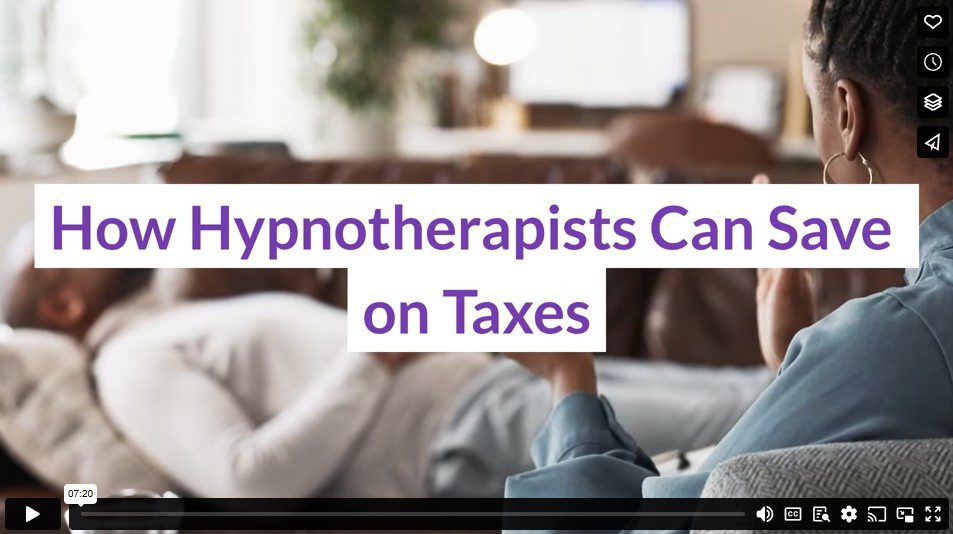As a professional hypnotist, you dedicate your time to helping others transform their lives, overcome challenges, and achieve their goals. While this work is gratifying, the administrative side of running a practice can sometimes feel overwhelming—especially when it comes to taxes.
The good news? With a little knowledge and planning, you can take advantage of tax deductions and credits to significantly reduce your tax burden, making your practice even more profitable. Let’s explore how you can save on taxes while complying with IRS regulations.
Understanding Tax Deductions and Credits
Before diving into specifics, let’s understand the difference between deductions and credits:
- Tax Deductions: These reduce your taxable income, decreasing the amount of tax you owe. For example, if you earn $50,000 and claim $10,000 in deductions, your taxable income decreases to $40,000.
- Tax Credits: These provide a dollar-for-dollar reduction in your tax bill. If you owe $5,000 in taxes and qualify for a $2,000 tax credit, your bill decreases to $3,000.
A tax credit is almost always more valuable than a tax deduction. A $1 tax credit saves you $1 on your taxes. A $1 tax deduction only saves you the taxes you would have paid on that dollar, usually about $.18 to $.25 for an average taxpayer.
Both deductions and credits will save you money on your tax obligation for the year. Knowing which ones apply to your hypnotherapy practice can significantly reduce your tax burden.
Common Tax Deductions for Hypnotherapists
Running a hypnosis business involves many deductible expenses. Here are some common deductions to look for:
Office Expenses
You can deduct expenses such as rent, utilities, internet, and office supplies if you operate from a dedicated office space—whether in your home or a rented location.
For home offices, ensure the space is exclusively used for business to qualify for the deduction. A tax expert or the IRS guidelines1 can help you understand how much of your rent or mortgage and utilities you can deduct for your home-based hypnosis business.
Marketing and Advertising
Expenses related to promoting your practice are potential deductions. These could include business cards, social media ads, promotional flyers, and other advertising costs.
Continuing Education and Training
Investing in your professional development is a hallmark of a committed hypnotherapist. The cost of workshops, certifications, online courses, and even professional books or journals are often deductible business expenses. If you’ve been considering advanced hypnotherapy training, the potential tax savings can make your course even more affordable.
Travel Expenses
If you travel for your hypnosis practice, you can deduct airfare, lodging, some of your meal costs, and transportation. Business travel includes attending a hypnotherapy conference, giving a lecture, or even meeting clients.
Professional Services
Fees paid to accountants, attorneys, or consultants who help manage your practice are deductible. Professional liability insurance and other business-related insurance policies are also deductible.
Equipment and Supplies
Your equipment and supply purchases can qualify as deductions. This deduction covers items like office chairs, printer paper, audio recording devices, or client management software.
If you have equipment for both work and personal use, refer to the IRS guidelines for how to calculate the deduction. For example, if you use your laptop for online hypnosis sessions and personal computing, the cost of the computer may be partially deductible.
Health Insurance
If you’re self-employed and pay for your own health insurance, you may be able to deduct the premiums you pay.
Common Tax Credits for Professional Hypnotists
While deductions lower your taxable income, credits reduce the taxes you owe. Here are some credits that may apply to your hypnosis practice:
Lifetime Learning Credit (LLC)
If you take hypnosis classes to enhance your skills, you might qualify for the Lifetime Learning Credit, which can cover up to 20% of eligible expenses (up to $10,000).
Since a tax credit is more valuable than a tax deduction, you are likely better off claiming the LLC if eligible instead of claiming the tax deduction for continuing education.
Energy Efficiency Credits
You may be eligible for credits if you’ve made energy-efficient improvements to a home office space.
Work Opportunity Tax Credit (WOTC)
If you employ individuals from certain targeted groups, such as veterans or long-term unemployed individuals, your practice may qualify for this credit.
Retirement Savings Contributions Credit (Saver’s Credit)
As a professional hypnotherapist, you’re likely self-employed and responsible for funding your own retirement. Contributions to a qualified retirement plan, such as an IRA or SEP IRA, could make you eligible for the Saver’s Credit.
Recordkeeping Tips for Maximum Savings
Here are some tips to help with the recordkeeping required to take advantage of tax deductions and credits:
Keep Receipts
Maintain organized records of all expenses, including receipts, invoices, and proof of payment.
Use Accounting Software
Accounting software can simplify expense tracking and categorize deductions. Since the software is a business expense, the purchase cost or monthly fees are likely deductible.
Track Mileage
If you use your vehicle for business purposes, keep a detailed log of miles driven, the purpose of each trip, and related expenses.
Document Home Office Use
For home office deductions, take photos of the space and keep records of utility bills and other expenses.
Consult a Tax Professional
A qualified tax advisor familiar with small businesses and self-employed individuals can help identify additional deductions and credits you might overlook. And remember: the cost of professional tax services is likely a deductible business expense.
Planning Ahead: Tax Strategies for Hypnotherapists
Tax planning isn’t just about saving money this year; it’s about setting yourself up for long-term success. Here are some strategies you can use to keep your tax costs down:
Maximize Retirement Contributions
Contributions to a SEP IRA or Solo 401(k) can reduce your taxable income while building your retirement savings.
Consider Incorporation
Forming an LLC or S-Corp could provide tax advantages depending on your income level. Consult a tax professional to evaluate your situation.
Invest in Your Practice
Upgrading your office, purchasing new equipment, or expanding your services can enhance your practice and create additional deductions.
Stay Informed
Tax laws change frequently. Keep up-to-date with regulations that impact small businesses and self-employed professionals.
By taking the time to understand tax deductions and credits, you can keep more of your hard-earned income. Whether deducting the cost of continuing education or claiming credits for energy-efficient improvements, every dollar saved is a dollar you can reinvest in your practice and your future.
While you should always consult the IRS or a professional tax expert if you are uncertain, these lists should give you a starting point for finding tax savings. A knowledgeable tax advisor can help ensure you’re taking full advantage of available savings while staying compliant. With proper planning and recordkeeping, tax season doesn’t have to be daunting—it can even become an opportunity to strengthen your financial foundation.
Video

Infographic
As a professional hypnotist, you transform lives, but handling administrative tasks, especially taxes, can be daunting. Tax planning isn’t merely about saving money today—it’s also about securing long-term success. Discover strategies to reduce your tax costs in this infographic.
1https://www.irs.gov/newsroom/how-small-business-owners-can-deduct-their-home-office-from-their-taxes




